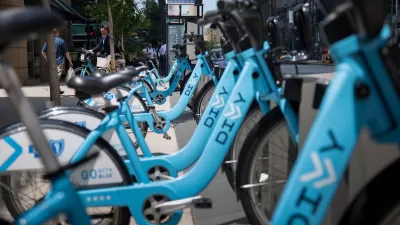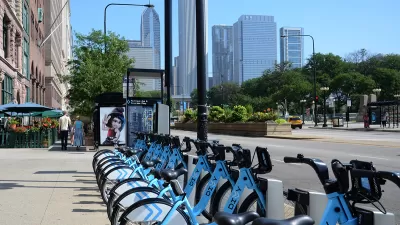A recent article details some of the complaints about the lack of reach and bikes in Chicago's growing and popular Divvy bikeshare system.
Tracy Swartz writes that Chicago's Divvy bikeshare program is encountering speed bumps: "Call it the Divvy blues. With one year—and two summers—under its belt, Divvy has seen an explosion in membership growth and usage—and to a lesser extent, criticism. Some cyclists recently have taken to social media to complain about racks with no bikes to rent and racks with no spaces to drop off bikes."
Swartz also notes that recently announced plans to expand the system came later than hoped: "Officials announced last month that Divvy plans to add 175 stations and 1,750 bikes in the spring—a year later than originally planned, upsetting some Chicagoans who thought bike share was coming sooner to their neighborhood."
Despite that, the vast majority of Divvy's quickly growing membership is happy with the service. As Swartz mentions at the end of the article, "Divvy counts more than 23,300 members, up from 6,769 members in August 2013," and a "survey in late January found 97 percent of the more than 2,600 Divvy members who responded were 'satisfied' or 'very satisfied' with the program."
FULL STORY: Divvy faces growing pains in Chicago

Maui's Vacation Rental Debate Turns Ugly
Verbal attacks, misinformation campaigns and fistfights plague a high-stakes debate to convert thousands of vacation rentals into long-term housing.

Planetizen Federal Action Tracker
A weekly monitor of how Trump’s orders and actions are impacting planners and planning in America.

In Urban Planning, AI Prompting Could be the New Design Thinking
Creativity has long been key to great urban design. What if we see AI as our new creative partner?

King County Supportive Housing Program Offers Hope for Unhoused Residents
The county is taking a ‘Housing First’ approach that prioritizes getting people into housing, then offering wraparound supportive services.

Researchers Use AI to Get Clearer Picture of US Housing
Analysts are using artificial intelligence to supercharge their research by allowing them to comb through data faster. Though these AI tools can be error prone, they save time and housing researchers are optimistic about the future.

Making Shared Micromobility More Inclusive
Cities and shared mobility system operators can do more to include people with disabilities in planning and operations, per a new report.
Urban Design for Planners 1: Software Tools
This six-course series explores essential urban design concepts using open source software and equips planners with the tools they need to participate fully in the urban design process.
Planning for Universal Design
Learn the tools for implementing Universal Design in planning regulations.
planning NEXT
Appalachian Highlands Housing Partners
Mpact (founded as Rail~Volution)
City of Camden Redevelopment Agency
City of Astoria
City of Portland
City of Laramie




























